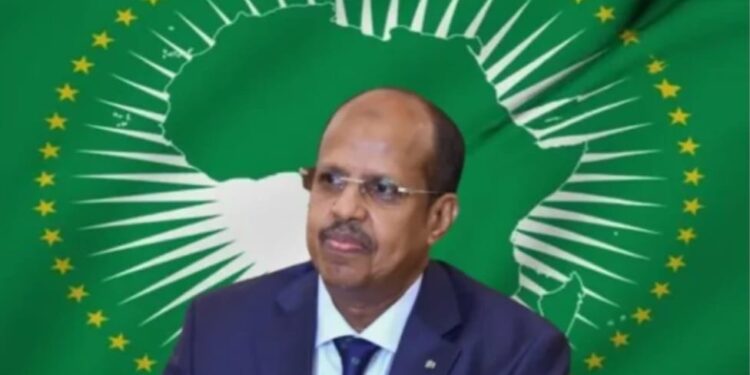On February 15, 2025, during the 38th African Union (AU) Summit in Addis Ababa, Ethiopia, African leaders elected Djibouti’s long-serving Foreign Minister, Mahmoud Ali Youssouf, as the new Chairperson of the African Union Commission (AUC). This election marks a significant milestone, as Youssouf becomes the first leader from the Horn of Africa region to assume this pivotal role within the AU. His election comes at a time when the continent faces numerous challenges, including escalating conflicts and pressing economic issues.
Youssouf, who has served as Djibouti’s Foreign Minister since 2005 and previously held the position of ambassador to Egypt, brings a wealth of diplomatic experience to the AUC. Youssouf succeeds Moussa Faki Mahamat of Chad, who has led the Commission since 2017. The election saw Youssouf defeating notable candidates, including Kenya’s former Prime Minister Raila Odinga and Madagascar’s ex-Foreign Minister Richard Randriamandrato. Odinga, a reformist, Pan-Africanist par excellence and a prominent figure in Kenyan politics, had aimed to secure the position as a capstone to his public service career.
The election process adhered to the AU’s rotational leadership principle, which, in this cycle, favored candidates from the East African bloc. This rotational system aims to ensure equitable representation across the continent’s diverse regions. The selection of Youssouf reflects a strategic choice by member states, considering his extensive diplomatic background and the geopolitical significance of the Horn of Africa.
Youssouf assumes leadership at a critical juncture for the African Union. The continent is grappling with multifaceted challenges, including political instability, economic disparities, and security threats. One immediate concern is the ongoing conflict in the Democratic Republic of Congo, which has the potential to escalate into a broader regional crisis. The AU’s role in mediating and resolving such conflicts is paramount, and Youssouf’s diplomatic acumen will be tested as he navigates these complex issues.
Another pressing issue is the prevalence of military juntas in West Africa, which undermines democratic governance and stability. The AU has faced criticism for its handling of coups and unconstitutional changes of government. Youssouf will need to strengthen the AU’s mechanisms for promoting democracy and constitutional order, ensuring that member states adhere to the Union’s principles and commitments.
Economic development remains a cornerstone of the AU’s Agenda 2063, which envisions a prosperous and integrated Africa. Youssouf’s leadership will be pivotal in advancing initiatives such as the African Continental Free Trade Area (AfCFTA), aiming to boost intra-African trade and economic cooperation. However, achieving these goals requires addressing infrastructural deficits, harmonizing trade policies, and fostering political will among member states.
The AU’s financial dependency on external donors has been a longstanding concern. Approximately 75% of the Union’s budget is sourced from international partners, raising questions about the organization’s autonomy and capacity to implement its agenda. Youssouf faces the formidable task of reforming the AU’s funding model, encouraging member states to fulfill their financial obligations, and exploring sustainable revenue streams to reduce reliance on external aid.
Geopolitical dynamics within the continent also present challenges. The existence of multiple and sometimes overlapping regional blocs, such as ECOWAS, SADC, EAC, and IGAD, can lead to fragmented approaches to continental issues. Youssouf will need to work towards harmonizing these regional entities, promoting cohesive policies, and ensuring that the AU serves as a unifying platform for all African nations.
The youth demographic in Africa is both a significant asset and a potential source of instability if not adequately addressed. With a rapidly growing young population, there is an urgent need for job creation, quality education, and healthcare services. Youssouf’s administration must prioritize policies that harness the potential of African youth, transforming them into drivers of economic growth and innovation.
In the international arena, Africa’s representation remains limited, particularly within institutions like the United Nations Security Council. During the pre-election debates, candidates, including Youssouf, advocated for permanent African seats on the Security Council, emphasizing the need for the continent to have a more influential voice in global affairs. Pursuing this objective will require strategic diplomacy and unified advocacy from AU member states.
Youssouf’s election has garnered international attention, with countries like Pakistan extending congratulations to the new Chairperson and his Deputy, Selma Malika Haddadi. This global recognition underscores the importance of the AU’s leadership in shaping not only continental but also international policies.
In conclusion, Mahmoud Ali Youssouf’s tenure as the Chairperson of the African Union Commission comes at a pivotal moment for Africa. The challenges are substantial, ranging from internal conflicts and political instability to economic development and international representation. However, with his extensive diplomatic experience and a clear mandate from member states, Youssouf has the opportunity to steer the continent towards greater unity, stability, and prosperity. The path ahead requires decisive action, collaborative efforts, and a steadfast commitment to the principles and aspirations of the African Union.










